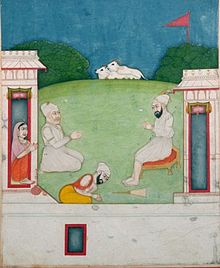Guru Angad Dev
| Guru Angad ਗੁਰੂ ਅੰਗਦ |
|
|---|---|

Opaque watercolour on paper c 1770
Asian Art Museum |
|
| Born |
Bhai Lehna March 31, 1504 Matte Di Sarai, Muktsar, Panjab, Mughal Empire (Present day India) |
| Died |
March 29, 1552 (aged 47) Khadur Sahib, Mughal Empire (Present day India) |
| Other names | The Second Master |
| Years active | 1539–1552 |
| Known for | Standardising the Gurmukhi Script |
| Predecessor | Guru Nanak |
| Successor | Guru Amar Das |
| Spouse(s) | Mata Khivi |
| Children | Baba Dasu, Baba Dattu, Bibi Amro, and Bibi Anokhi |
| Parent(s) | Mata Ramo and Baba Pheru Mal |
Guru Angad (31 March 1504 – 29 March 1552) was the second of the ten Sikh Gurus. He was born in a Hindu family, with the birth name as Lehna, in the village of Harike (now Sarae Naga, near Muktsar) in northwest Indian subcontinent. Bhai Lehna grew up in a Khatri family (Kshatriya, traditionally warriors), his father was a small scale trader, he himself worked as a pujari (priest) and religious teacher centered around goddess Durga. He met Guru Nanak, the founder of Sikhism, and became a Sikh. He served and worked with Guru Nanak for many years. Guru Nanak gave Bhai Lehna the name Angad, chose Angad as the second Sikh Guru instead of his own sons.
After the death of Guru Nanak in 1539, Guru Angad led the Sikh tradition. He is remembered in Sikhism for adopting and formalizing the Gurmukhi alphabet from pre-existing Indo-European scripts such as the Tankre of the Himalayan region. He began the process of collecting the hymns of Nanak, contributed 62 or 63 hymns of his own. Instead of his own son, he chose a Vaishnava Hindu Amar Das as his successor and the third Guru of Sikhism.
Guru Angad was born in a village, with birth name of Lehna, to Hindu parents living in northwestern part of the Indian subcontinent called the Punjab region. He was the son of a small but successful trader named Pheru Mal. His mother's name was Mata Ramo (also known as Mata Sabhirai, Mansa Devi and Daya Kaur). Like all the Sikh Gurus, Lehna came from Khatri caste.
At age 16, Angad married a Khatri girl named Mata Khivi in January 1520. They had two sons (Dasu and Datu) and one or two daughters (Amro and Anokhi), depending on the primary sources. The entire family of his father had left their ancestral village in fear of the invasion of Babar's armies. After this the family settled at Khadur Sahib, a village by the River Beas near what is now Tarn Taran.
...
Wikipedia
